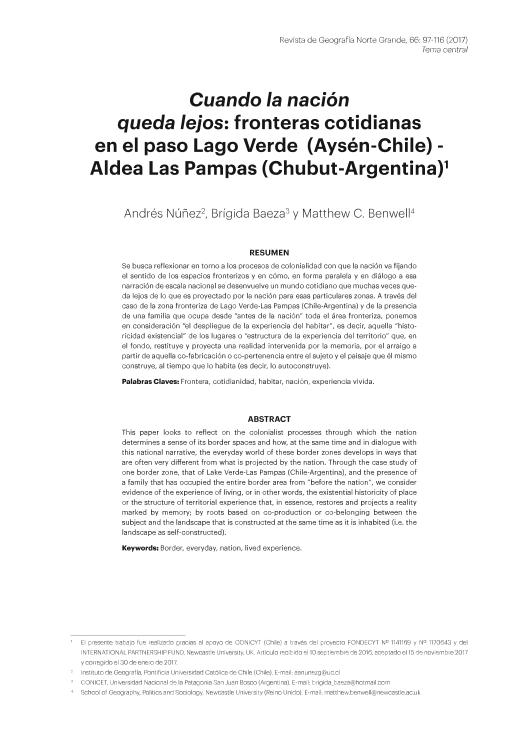Mostrar el registro sencillo del ítem
dc.contributor.author
Nuñez, Andres

dc.contributor.author
Baeza, Brigida Norma

dc.contributor.author
Benwell, Matthew C.
dc.date.available
2017-12-13T14:33:51Z
dc.date.issued
2017
dc.identifier.citation
Nuñez, Andres; Baeza, Brigida Norma; Benwell, Matthew C.; Cuando la nación queda lejos fronteras cotidianas en el paso Lago Verde (Aysén-chile) - Aldea Las Pampas (Chubut-Argentina); Pontificia Universidad Católica de Chile; Revista de Geografía Norte Grande; 66; 2017; 97-116
dc.identifier.issn
0718-3402
dc.identifier.uri
http://hdl.handle.net/11336/30388
dc.description.abstract
Se busca reflexionar en torno a los procesos de colonialidad con que la nación va fijando el sentido de los espacios fronterizos y en cómo, en forma paralela y en diálogo a esa narración de escala nacional se desenvuelve un mundo cotidiano que muchas veces queda lejos de lo que es p royectado por la nación para esas particulares zonas. A través del caso de la zona fronteriza de Lago Verde-Las Pampas (Chile-Argentina) y de la presencia de una familia que ocupa desde “antes de la nación” toda el área fronteriza, ponemos en consideración “el despliegue de la experiencia del habitar”, es decir, aquella “histo- ricidad existencial” de los lugares o “estructura de la experiencia del territorio” que, en el fondo, restituye y p royecta una realidad intervenida por la memoria, por el arraigo a partir de aquella co-fabricación o co-pertenencia entre el sujeto y el paisaje que él mismo construye, al tiempo que lo habita (es decir, lo autoconstruye).
dc.description.abstract
This paper looks to reflect on the colonialist processes through which the nation determines a sense of its border spaces and how, at the same time and in dialogue with this national narrative, the everyday world of these border zones develops in ways that are often very diff erent from what is projected by the nation. Through the case study of one border zone, that of Lake Verde-Las Pampas (Chile-Argentina), and the presence of a family that has occupied the entire border area from “before the nation”, we consider evidence of the experience of living, or in other words, the existential historicity of place or the structure of territorial experience that, in essence, restores and projects a reality marked by memory; by roots based on co-production or co-belonging between the subject and the landscape that is constructed at the same time as it is inhabited (i.e. the landscape as self-constructed).
dc.format
application/pdf
dc.language.iso
spa
dc.publisher
Pontificia Universidad Católica de Chile

dc.rights
info:eu-repo/semantics/openAccess
dc.rights.uri
https://creativecommons.org/licenses/by-nc-sa/2.5/ar/
dc.subject
Frontera
dc.subject
Cotidianidad
dc.subject
Habitar
dc.subject
Nación
dc.subject
Experiencia Vivida
dc.title
Cuando la nación queda lejos fronteras cotidianas en el paso Lago Verde (Aysén-chile) - Aldea Las Pampas (Chubut-Argentina)
dc.type
info:eu-repo/semantics/article
dc.type
info:ar-repo/semantics/artículo
dc.type
info:eu-repo/semantics/publishedVersion
dc.date.updated
2017-12-04T18:09:16Z
dc.identifier.eissn
0718-3402
dc.journal.number
66
dc.journal.pagination
97-116
dc.journal.pais
Chile

dc.journal.ciudad
Santiago
dc.description.fil
Fil: Nuñez, Andres. Pontificia Universidad Católica de Chile; Chile
dc.description.fil
Fil: Baeza, Brigida Norma. Universidad Nacional de la Patagonia; Argentina. Consejo Nacional de Investigaciones Científicas y Técnicas; Argentina
dc.description.fil
Fil: Benwell, Matthew C.. Newcastle University; Reino Unido
dc.journal.title
Revista de Geografía Norte Grande
dc.relation.alternativeid
info:eu-repo/semantics/altIdentifier/url/http://ref.scielo.org/r5n995
Archivos asociados
